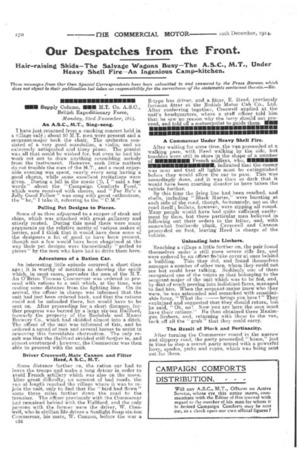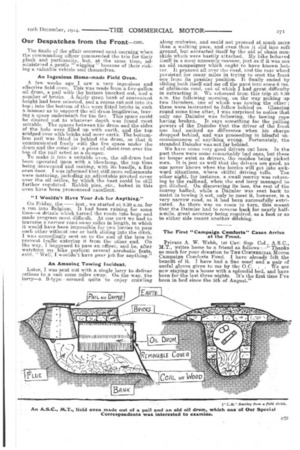Our Despatches from the Front.
Page 8

Page 9

If you've noticed an error in this article please click here to report it so we can fix it.
Hair-raising Skids—The Salvage Wagons Busy—The A.S.C., M.T., Under Heavy Shell Fire—An Ingenious Camp-kitchen.
These messages from Our Own Special Correspondents have been submitted to and censored by the Press Bureau, which does not object to their publication but lakes no responsibility for the correctness of the statements contained therein.—ED.
••••••••••••••••• Mt Supply Column NMI M.T. Co. A.S.C., British Expeditionary Force, Monday, 23rd November, 1914,
An A.S.C., KT., Sing-song.
I have just returned from a smoking concert held in a village café ; about 50 M.T. men were present and a sergeant-major took the chair. The orchestra consisted of a very good mandoline, a violin, and an extremely antiquated and tinny piano. The pianist was all that could be wished for, but even he had his work cut out to draw anything resembling melody from the instrument. However, such little matters do not trouble the men of the M.T., and a most enjoyable evening was spent, nearly every song having a good chorus, while some excellent recitations were given. During a lull in the music ( ?), I "said a feiv words" about the "Campaign Comforts Fund," which were received with cheers, and "For He's a jelly Good Fellow" was sung with great enthusiasm, the he," I take it, referring to the " CM."
Pulling Pet Designs to Pieces.
Some of us then adjourned to a supper of steak and chips, which was attacked with great gallantry and utterly routed. During this meal there were many arguments on the relative merits of various makes of lorries, and 1 think that it. would have done some of the designers a lot of good to have been present, though not a few would have been chagrined at the way their pet designs were theoretically "pulled to pieces" by the men who have had to drive them here.
Adventures of a Ration Car.
An interesting little episode 'occurred a short time ago ; it is worthy of mention as showing the spirit which, in most cases, pervades the men of the M.T. An O'Brien Thomas Commercar was ordered to proceed with rations to a unit which, at the time, was resting some distance from the fighting line. On its arrival, the officer in charge was informed that the unit had just been ordered back, and that the rations could not be unloaded there, but would have to be sent on. After proceeding for a 'short distance, further progress was barred by a large six-ton Hanford, formerly the property of the Rochdale and Manor Brewery Co., which had skidded almost into a ditch. The officer of the unit was informed of this, and he ordered a squad of men and several horses to assist in removing this formidable obstruction. The only result was that the Hallford skidded still further in, and almost overturned ; however, the Commercar was then able to proceed with the unit.
Driver Cresswell, Mate Cannon and Fitter Heed, A S.C., M.T.
Some distance further on, the ration car had to leave the troops and make a long detour in order to avoid French artillery which was also on the move. after great difficulty, on account of bad roads, the van at length reached the village where it was to rejoin the unit, only to find that the "bird had flown" some three miles further down the road to the trenches. The officer previously with the Commercar had remained behind with the Hanford, and the only persons with the former were the driver, W. Creswell, who in civilian life drives a Sunlight Soap six-ton Commercar, his mate, W. Cannon, before the war a c24
B-type bus driver, and a fitter, E. Heed, previously foreman fitter at the British Motor Cab Co., Ltd. After conferring together, Creswell applied at the unit's headquarters, where a staff officer told him that he saw no reason why the lorry should not proceed, and told off a motorcyclist to guide them. ENE 111•••••••••••••1111111•111111111111111•11111•111111 A Commercar Under Heavy Shell Fire.
After waiting for some time the van proceeded at a walking pace, with Heed walking by the side, but troubles were still in store in the shape of a number of 11111•••••• French soldiers, who, 11111111•11111. 11111.1111.111.1111M111111., indicated that the enemy was near and that all lights must be extinguished before they would allow the car to pass. This was accordingly done, and it was then so dark that it would have been courting disaster to have taken the vehicle further.
By this time the firing line had been reached, and shells, including "Black Marias," were bursting at each side of the road, though, fortunately, not on the road itself ; bullets, however, were zipping all round. Many people would have had quite sufficient excitement by then, but these particular men believed in following out their orders to the letter, and, with somewhat foolhardy pluck, Cresswell and Cannon proceeded on foot, leaving Heed in charge of the vehicle.
Unloading into Limbers.
Reaching a village a little further on, the pair found themselves under a still Fiore severe rifle fire, and were ordered by an officer to' take cover at once behind a building. This they did, and found themselves amongst a number of other men, whom they could not see but could hear talking. Suddenly one of them recognized one of the voices as that belonging to the sergeant-major of the unit which was to be fed, and, by dint of much peering into indistinct faces, managed to find him. When the sergeant-major knew who they were, he was astounded and remarked with oonsider able force, "What the brings you here ?" They explained and suggested that they should return, but he said, "Oh, no I Now you are here the men must have their rations." He then obtained three Maximgun limbers, and, returning with these to the van, took off all the " grub " that they could carry.
The Result of Pluck and Pertinacity.
After turning the Commercar round in the narrow and slippery road, the party proceeded "home," just in time to stop a search party armed with a powerful lorry, spades, picks and ropes, which was being sent out for them.
Our Despatches from the Front—con.
The finale of the affair occurred next morning when the commanding officer commended the trio for their pluck and pertinacity, but, at the same time, administered a gentle " wigging" because of their risking a valuable vehicle and themselves.
An Ingenious Home-made Field Oven.
A few weeks ago I saw a very ingenious and effective field-oven. This was made from a five-gallon oil drum, a pail with the bottom knocked out, and a number of -bricks. A fairly steep bank of convenient height had been selected, and a recess cut out into its top ; into the bottom of this were fitted bricks in such a manner as to support the oil drum lengthwise, leaving a space underneath for the fire. This space could be cleared out to whatever depth was found most suitable. The spaces between the drum and the sides of the hole were filled up with earth, and the top bridged Over with bricks and more earth. The bottomless pail was fitted in behind the drum, so that it communicated freely with the fire space under the drum and the outer air : a piece of sheet-iron over the top of the pail acted as a damper. To make it into a suitable oven, the oil-drum had been operated upon with a blowlamp, the top thus being unsweated and making, with its handle, a fine oven door. I was informed that still more refinements were maturing, including an adjustable pivoted cover over the oil orifice, by which the heat could be still further regulated. Rabbit pies, etc.. baked in this oven have been pronounced excellent.
"I Wouldn't Have Your Job for Anything."
On Friday, the — inst., we started at 9.30 a.m. for a run into Belgium. It had been raining for some time—a drizzle which turned the roads into bogs and made progress most difficult. At one part we had to traverse a narrow road some miles in length, in which it would have been impossible for two lorries to pass each other without one or both sliding into the ditch. I was accordingly sent on to the end of the lane to prevent traffic entering it from the other -end. On the way, I happened to pass an officer, and he, after watching my bike perform several acrobatic feats, said "Well, I wouldn't have your job for anything."
An Amusing Towing Incident.
Later, I was sent out with a single lorry to deliver rations to a unit some miles away. On the way, the lorry—a B-type—seemed quite to enjoy crawling along crabwise, and could not proceed at much more than a walking pace, and even then it slid into soft ground, but extracted itself by the aid of chain nonskids which were hastily attached. My bike behaved itself in a :nost unseemly manner, just as if it was not an old campaigner which ought to have known better. It pranced all over the road, and the rear wheel persisted for many miles in trying to oust the front one from its premier position. It finally ended by sliding both itself and me off the pave into some 6 ins. of glutinous mud, out of which I had great difficulty in extracting it We returned from this trip at 8.30 a.m. the following morning, on the way picking up two Daimlers, one of which was towing the other ; these were instructed to follow behind us. Glancing round some time after, I was surprised to notice that only one Daimler was following, the towing rope having broken. It says something for the pulling powers of the Daimler that the driver of the front one had noticed no difference when his charge dropped behind, and was proceeding in blissful unconsciousness of anything wrong. Fortunately, the stranded Daimler was not far behind.
We have some very good drivers out here. In the past there were some remarkably bad ones, but these no longer exist as drivers, the residue being picked men. It is just as well that the drivers are good, as one never knows when the lorries will get into awk ward situations, where skilful driving tells. The other night, for instance, a small convoy was returning to the railhead, when the end lorry managed to get ditched. On discovering its loss, the rest of the convoy halted, while a Daimler was sent back to assist in towing it out, only to meet it., however, in a very narrow road, as it had been successfully extricated. As there was no room to turn, this meant that the Daimler had to reverse back for nearly halfa-mile, great accuracy being required, as a foot or so to either side meant another ditching.
The First "Campaign Comforts" Cases Arrive at the Front.
Private A. W. Webb, let Cav. Sup. Col., A.S.C., MT., writes home to a friend as follows :—" Thanks so much for your donation to THE COMMERCIAL MOTOR Campaign Comforts Fund. I have already felt the benefit of it. I have had a fine scarf and a pair of useful gloves given to me by the 0.0. . . We are now staying in a house with a splendid bed, and have been for the last three nights. It's the first time I've been in bed since the 5th of August."


















